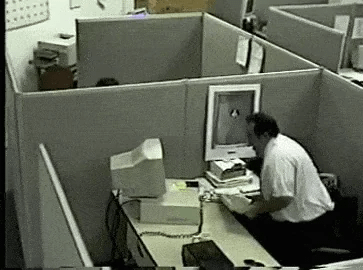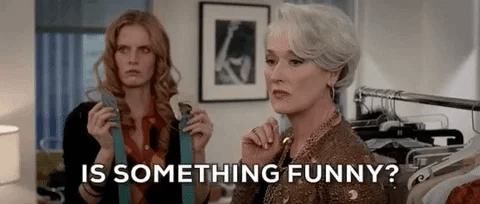In my last post, I wrote about whether it’s normal to change your mind about your career. The short answer? Yes—potentially, many times over.
As I will Substack about until the cows come home, change is one of the only constants we have in life, whether we’re dealt cosmic blows or experience incremental shifts in our identities.
I’m fascinated by the question of how to be during these transitions. How pain and growth sit side by side. How we allow ourselves to mourn what was, while also feeling excited about what could be.
Yet when it comes to our working lives, we don’t always have the luxury of simply sitting with our feelings. Faced with decisions to make and bills to pay, we’re required to take action. So for part two of this series on career crossroads, I wanted to offer a more practical guide to navigating the in-between places in your career: when you’ve realised you kind of hate your job, what do you actually do about it?
The mess
Be it a particular role, profession, industry or environment, there are many reasons why work can feel unfulfilling, draining or stressful. Perhaps:
You’ve been affected by layoffs
You’ve noticed your passion for your current role or profession waning
Your work no longer fits your life (location, financial goals, childcare, etc.)
You’ve recovered or are still recovering from a period of burnout
You just can’t shake the feeling that there must be more to work (and life) than your current day-to-day
Whatever the case, you might be feeling confused about what to do now and uncertain as to what’s next.
The problem is, falling out of love with your job is much like the waning of a relationship: it’s tempting to look for answers in everything—and everyone—but yourself.
Perhaps you blame your narcissistic boss or toxic company culture. So you scroll through job ads with the same dogged persistence as swiping through profiles on a dating app, hoping something or someone else might save you.
Or you wonder if it’s time for a completely new direction. You watched a YouTube video about a woman who quit her job to cross stitch ironic slogans on wall hangings, so you consider starting your own Etsy business. LinkedIn is full of people selling online courses while they live it up in Indonesia—how hard can it be?
Can you tell that I’ve been there?
While recognising when you’re in an unhealthy environment and giving yourself permission to daydream are completely valid, dwelling in victimhood or trying to copy someone else’s life don’t tend to be conducive to taking positive and practical next steps.
And trust me, I get it. In the slow dawning that the thing you’ve spent years working your arse off for is no longer something you want, it’s natural to feel wracked by indecision, disappointment, or even guilt. You might be thinking “I wish someone would just tell me what to do”. The truth is, other people will rarely have the answer.
Make it make sense
Interventions like mentoring can be so effective if you do know (at least roughly) where you want to go. And your loved ones might be a wonderful source of guidance. But if you’re still in the unknown, advice can be a distraction or actively unhelpful.
Remember, friends and family usually want to keep us safe: stay in the stable job, enjoy a few nice holidays a year, save up for a house. Sometimes this has good intentions (i.e. our health and wellbeing), but it can also stem from their own subconscious insecurities or values, i.e. keeping us “safe” to reinforce their self-image and definition of success.
The same can apply to people on social media, whether they seek validation for their life choices or even a direct transaction.
So how do you find your own answers?
Careers are satisfying and fulfilling when they align with what’s important to us, contribute to our unique definition of success, and allow our natural talents to shine.
Of course, we have little to no concept of what this means when we’re still in/fresh out of education and someone hands us a job or UCAS application form. Plus, these things continue to change throughout the course of our lives.
That’s why so many of us end up at a crossroads: unsure whether to carry on as we are or try a new path. The best way forward? Getting to know yourself all over again.
Disclaimer: this post is a biggie, as I wanted to give you enough guidance for each exercise. Feel free to skim through and save for a rainy day 🙂
The work: 4 steps for navigating a career transition
Before we get into some practical steps that can help you figure out your next career move—or realise that you might, in fact, be OK where you are—I want to caveat that this work isn’t about “doing what you love” for every single day of the rest of your life, banishing the Sunday Scaries forevermore, or having your “dream” job.
The reality is that no career or job is perfect. There will always be sacrifices, boring admin, bad days and annoying people. For me, it’s about ticking most of your boxes and having as many “good” days as possible.
Step 1: Be honest with yourself
We’re going to get into some reflective exercises I’ve used time and time again, both on myself and with coaching clients. However, before you do anything I want you to be really honest about where your head’s at and how you’re feeling.
You don’t need to be jumping for joy, but if you’re not feeling even the tiniest bit curious and excited about what the future could hold, it might be a sign that you’re still processing some stress, loss, or other trauma.
I know this feeling all too well, having experienced a double whammy of burnout and grief. As I wrote about in part one, it can be deeply necessary to de-prioritise work’s status in your life while you heal—whether that’s simply working to pay the bills or taking a break altogether.
Step 2: Work out what’s important to you
When I’m coaching clients through a career transition, we pretty much always start with values work. That’s because values are at the root of most professional disillusionment. Maybe:
Your core values are in conflict with the work you do
Your company values don’t align with your personal values
Your values clash with someone else’s values (e.g. your manager or coworkers)
I’ve shared this values exercise in previous posts, but here it is again.
How to identify your values
Start with a big list, like this one, which isn’t an exhaustive list, but something to get you started.
Write down all of the words that speak to you (it can be interesting to notice ones that don’t too).
Write down any other words that come to you, which aren’t on the list above. Remember, a value is a noun that describes a particular quality, concept or state of being, not an adjective or personality trait (i.e. “kindness”, not “kind”).
Now, choose just 10 values from this list. If you’re struggling to narrow it down, try not to overthink it. Be guided by what you feel most drawn to—which ones could you absolutely not live without?
Next, choose just 5 values from your shortlist. You may be able to group similar words into one umbrella value. For example, “personal growth”, “learning” and “curiosity” might simply be “growth”.
When you have your top 5, define each value in your own words. Try to explain why you were drawn to it and what it means to you. There’s no “correct” definition here—rather, it’s about what it represents in your life.
Close your notepad/laptop and go forget about values.
Allow a few days to pass, then revisit your list. Do these values still speak to you? Is anything missing from the list? Would you expand on their definitions some more? Make any necessary changes.
Once you’ve got your list of core values, reflect on how they are (or aren’t) showing up in your working life. Does your current career path honour these values? What is out of alignment? What would allow you to nurture your values even more?
A note on values
As someone wisely pointed out at an event I hosted last week, there may be values that seem to clash with each other. For example, you might value creativity, but also stability—so how does this add up in the context of a job that has a great salary and progression, but doesn’t fire up your inner artist?
In this case, you might consider a) which of these values is most important in your life right now (e.g. you are saving for a house, so stability takes precedence) and b) how these values can show up in different parts of your life (e.g. you stick out the job and take up pottery as a hobby).
While values can be helpful anchors, they can shift and adapt as you or your circumstances change.
Step 3: Be proud of the things that make you shine
Work is more enjoyable and rewarding when it allows us to play to our strengths—and I use this word to mean character strengths, rather than professional skills, technical proficiencies or special talents.
While these abilities are, of course, very important to your career, they don’t tend to be what drives us on a deeper level. To access this information, we need to think about what is unique to us—not stuff loads of other people can do too.
As an example, one of my professional “trades” is copywriting—a skill could take me in a whole load of different directions, and one that lots of people possess. However, when I drill down into my strengths, I realise that my sense of humour is a superpower. So I’m best placed to focus on writing for fun brands with a witty tone of voice, rather than technical or corporate comms.
How to identify your strengths
Start by thinking about how others would describe you (this is often easier than describing yourself!). Write down 5 positive words a relative, friend, partner or a colleague might say about you. For example: kind, creative, conscientious, funny, energetic.
Next, write down 5 words you’d use to describe yourself. Notice if these are different or the same as how you think others perceive you.
To take this a step further, go ahead and ask someone who knows you well to describe you. It can be illuminating to compare how you think others would describe you with what they actually say. Maybe you’ve got some blindspots around your own strengths…or maybe you’re hiding some of your key strengths from others.
Compare your three lists. Now choose the 5 strengths that feel most important to you—ones you cherish the most, ones others cherish the most, or qualities that you’d like to build on.
Reminding yourself of your strengths—the qualities, traits or attributes that make you shine—can be a great foundation for self-esteem and confidence, which often take a dip in the vulnerable, liminal moments of life. When I was training as a coach and battling imposter feelings, I liked to list my five strengths in my head to ground myself before a session.
You can also use your strengths to choose roles, projects or collaborators, and communicate your selling points to others (e.g. highlighting them in your CV or LinkedIn profile).
Step 4 - Get clear on not just where but how you’d like to be
If you’re feeling stuck in your career, reevaluating what it is that you really want can show you whether you’re on track or veering off course.
While talk of vision boards and manifesting is often dismissed as “woo woo”, there’s plenty of research-backed neuroscience that suggests we have some power to make our hopes and dreams a reality.
That’s why articulating or visualising what you want to achieve can be really effective—from countering negative beliefs to aligning your conscious and subconscious mind, so that you’re more likely to notice opportunities right under your nose.
You can do this in lots of different ways, depending on what feels best for you.
How to set your vision
Make a vision board - a vision board is a collection of images that represent the life you want to live. You can make one on Pinterest, Canva or through good ol’ fashioned scrapbooking. Vision boards are more than just a pretty picture—there are lots of reasons why your brain responds well to visualisation techniques.
Define your North Star - a North Star is a high-level aspiration: the destination you are working towards in 5-10, or even 20 years’ time, rather than a more tactical or short-term goal. It could be:
A career milestone e.g. “making the Forbes 30 under 30”
A financial goal e.g. “earning 100K by the time I am 35”
A health or wellbeing goal e.g. “I will dedicate an hour every week to therapy to look after my mental health”
A hobby e.g. “I have mastered a headstand and continue to build and strengthen my yoga practice”
An impact goal e.g. “I donate 1% of my business profits to environmental charities”
Set an intention - an intention is a phrase or even simply a word that you will try to infuse your life with as much as possible, without trying to get it perfect all the time (which, actually, applies to all of these vision setting methods!).
For example…
“I will live with ease”
“I will find balance”
“I will follow joy”
Intentions and vision boards can complement each other well, e.g. you could design a vision board around the word “joy”. Values will likely come into this too.
Pen a magazine bio - project yourself a few years (let’s say 5-10) into the future and imagines what someone else might write about you when you have succeeded in your goals or intentions. Picture a short profile of someone celebrated in their field, with a headline, a few paragraphs and a glossy headshot. Now imagine that person is you.
What’s the headline? e.g. “PR veteran launches groundbreaking new creative studio for female-founded brands” or “Working mum signs first book deal to help parents juggle childcare and careers”
What’s the story and the need-to-know? The who, what, where, when and why
You can get as creative and specific as you like, identifying particular milestone or adding colour to the story e.g. “Alongside her burgeoning career as a writer, Elizabeth lives in Margate with her partner and their poodle, Ziggy”
Design your dream day - Simply imagine yourself in the future and describe how you would like to spend an average day. Nothing is too mundane here—the idea is to write about the rhythms and rituals that light you up, and keep you happy and healthy.
For example, “I’ll wake up at 7am and make myself a coffee in my kitchen, which overlooks the garden. I’ll do some yoga, then get dressed in clothes that bring me joy. I’ll cycle to my coworking space and spend the morning doing deep work, then take client calls in the afternoon. I’ll take an hour to eat lunch outside by the river. After work, I’ll meet a friend for a drink and a chat. Then I’ll go home and watch a film with my partner.”
A note on goal-setting
Something to bear in mind about goal-setting is Gestalt’s Paradoxical Theory of Change, which I often reference.
In summary, it’s the idea that change happens when you become what you are, not when you try to become what you are not. That’s why it’s important to set visions or North Stars that are true to you and feel achievable.
Particularly if you are a high achiever, setting goals that are too rigid or lofty can be counterproductive and end up making you feel worse about yourself. Not everything in life is within our control, so exercises like vision boards and dream days allow you to imagine the quality and feeling of your future life, without limiting it to specifics.
Bringing it all together
What I’ve shared above (I wasn’t lying when I said it was a biggie, right?) is a bit like a crash-course in self-knowledge—which, ultimately, is the key to getting through a career change with self-compassion, grace and grit.
Values, strengths and vision work are my go-to tools for uncovering this self-knowledge, as they help you understand:
What’s important
What makes you unique
How you’d like your life to look/feel
What all three have in common is that they allow you to redefine what “success” looks like to you, rather than following a path that’s expected of you or you think you should follow. And in the context of a rapidly changing world of work, where most of us are expected to have multiple different careers, they can act as the roots that ground you while different branches grow.
However, these tools are only the tip of the iceberg. There are tonnes of other approaches and resources you can use to reflect or work through with a coach (like me 😉).
Good luck!
I hope this guide has been helpful—drop me a comment if you have any questions about the exercises.
If you’re curious about Crossroads, my 1:1 coaching programme for navigating career transitions, you can email me at luciafontaina@gmail.com.
What should I write about next?
While I’ve had work on the brain recently, this Substack is still dedicated to the full spectrum of life’s complexities, so I’d love to hear from you on any challenges, observations or hot messes you’d like to read about. I’m about to go on holiday for two weeks, so I’ll have plenty of thinking/scribbling time…










